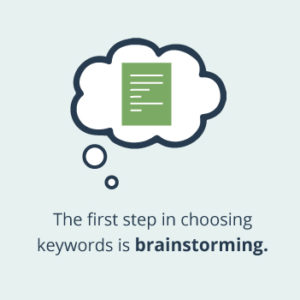 You’re stumped! You just created the BEST content to add to your blog but you are now stuck. What are the MOST effective SEO keywords to use on your site? Where do you start? What tools do you use?
You’re stumped! You just created the BEST content to add to your blog but you are now stuck. What are the MOST effective SEO keywords to use on your site? Where do you start? What tools do you use?
Keyword research is THE most important part of effective SEO. If you pick the wrong keywords, you will waste both a lot of time and money. You also won’t get the search engine rankings you want.
There are some basic criteria you need to keep in mind when searching for keywords:
- Relevancy – What keywords are relevant to your market/niche?
- Search volume – There are many users searching for that keyword/term
- Current ranking – What is the keyword ranking? If it’s a high volume keyword such as “marketing” (ranked #10) compared to “retail marketing” (ranked #600)– go with the former because you’ll get better results faster (more qualified traffic)
How to Avoid Bad Keywords
- Keywords should be relevant with a high traffic volume
- People aren’t always going to search for difficult terms. Don’t use complicated terms such as “freestyle snowboarding champion in Lake Tahoe, California” It’s very unlikely that a person is going to search for that specific term – keep it simple!
- Sometimes keywords with high search volumes may be more difficult – you may have to work a little harder! Check out the following tools to analyze keyword difficulty: SEOmoz Keyword Difficulty Tool and SEOlogs Keyword Difficulty Check Tool.
How to Choose Effective Keywords
The first step in choosing keywords is brainstorming. You also need powerful tracking tools that will lead you in the right direction. Learn about the buying process and how consumers research and buy online.
- First, ask yourself this question: “How would my customers/clients search for my products and services online?”
- Brainstorm a seed list (it helps to brainstorm with other colleagues) – choose a list of terms that would answer the above question.
- Use the following keyword tools to expand your list: Google Keyword Tool, WordTracker and WebCEO. This is how you optimize keywords/terms that people search for the most.
- Place keywords you find underneath your seed list. The goal is to grow your list with well-optimized keywords/phrases. You need to figure out which keywords have the most relevancy, search volume and current tracking.
 You could spend up to hours looking for optimized keywords – that may sound long and boring but you could end up with the wrong keywords and mess up your SEO. It’s better to take the time to research keywords NOW then to regret it later!
You could spend up to hours looking for optimized keywords – that may sound long and boring but you could end up with the wrong keywords and mess up your SEO. It’s better to take the time to research keywords NOW then to regret it later!- Pay attention to keyword discovery – broad keywords (broad terms with a high search volume) versus long-tail keywords (less searches but more specific/relevant terms related to your products and services)
- Figure out the search volume for each keyword. You need a relevancy value for each keyword and then calculate the score of each keyword.
- Choose 5-10 primary keywords (keywords that have high relevancy and search volumes), 20-60 secondary words (lower search volume but very relevant) and keyword modifiers (words that go before, after or in the middle of primary or secondary words – i.e. “free”)
When choosing keywords keep the following criteria in mind:
- Brand names (i.e. Target)

